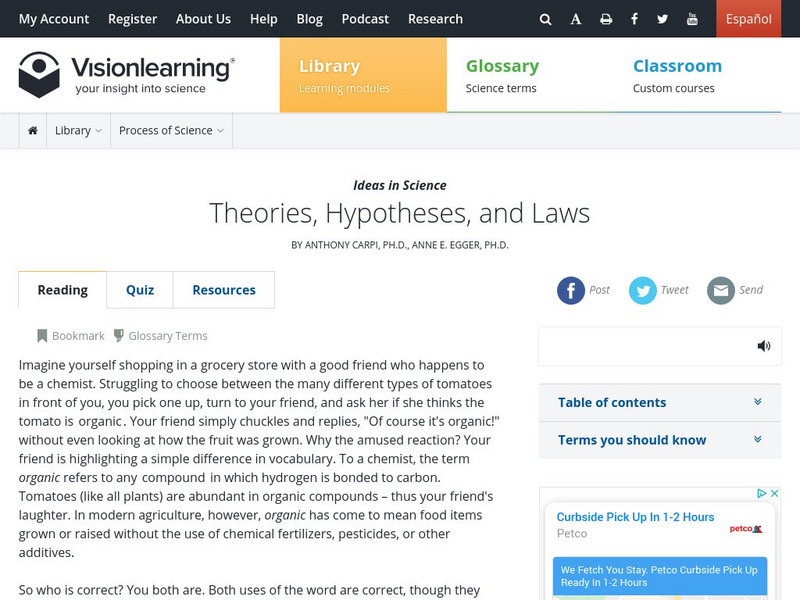Hi, what do you want to do?
Curated OER
AP: Chapter 22: Descent with Modification
After taking in part of Darwin's The Origin of Species, advanced biology learners reiterate its themes and concepts. Also examined are the contributions to the theory of evolution made by Linnaeus, Lamarck, and Wallace. Use this...
Curated OER
How Plants Are Named
Here is an interesting set of slides that give some nice examples of the reasoning behind scientific Binomial Nomenclature. Some examples of scientific naming are given along with their common names. There is not much more detail on...
Curated OER
How Plants are Named
Genus and species are the 2 categories from which the plant classifications are derived and combined to create a scientific name. The rules for capitalization and underlining are given in these clean and logical slides.
Curated OER
Classification
In this classification worksheet, high schoolers complete a word search puzzle by finding 12 words associated with taxonomy and classification.
Curated OER
Organizing Life
In this taxonomy learning exercise, students learn about Linnaeus' system for classifying living things. Students complete 2 fill in the blank and 2 short answer questions based on what they read.
Curated OER
Naming New Species
Students explore science of taxonomy and the Five Kingdoms of life,
categorize organisms into Kingdoms, and create multi-media presentations illustrating knowledge of a Kingdom. They collect data and related pictures on the Internet,...
Curated OER
AP: Chapter 26: Origin of Life
Five pages take biologists on a generalized survey of the origin of life. Queries are made regarding theories of how life developed, ancient Earth conditions, and the ever-changing field of taxonomy. The experiments of different...
Curated OER
Classification
In this classification worksheet, students will look at how biological classification began and how scientific names are used in biology. Students will use a table showing the classification of four organisms to answer 10 short answer...
Curated OER
Taxonomy and the World of Microorganisms and Viruses
In this taxonomy worksheet, students understand how organisms are classified using Linnaeus' system. Students classify organisms as either plant or animal. This worksheet has 24 fill in the blank and 6 matching questions.
Vision Learning
Visionlearning: Ideas in Science: Theories, Hypotheses, and Laws
Learning module looking at scientific explanations. Discussion covers theories and how they develop, some well-known theories and their origins, and how theories are revised and refined. Also, covers hypotheses and laws. The three...
Open Curriculum
Open Curriculum: Classification: Form and Function
Find out about taxonomy, and understand why scientists classify organisms. Study the concepts behind Linnaean taxonomy and binomial nomenclature.
CK-12 Foundation
Ck 12: Biology: Phylogenetic Classification
[Free Registration/Login may be required to access all resource tools.] Introduces phylogenetic classification and compares it with the Linnaean classification.
CK-12 Foundation
Ck 12: Biology: Phylogenetic Classification
[Free Registration/Login may be required to access all resource tools.] Introduces phylogenetic classification and compares it with the Linnaean classification.
CK-12 Foundation
Ck 12: Life Science: Organization of Living Things
[Free Registration/Login may be required to access all resource tools.] When you see an organism that you have never seen before, you probably put it into a group without even thinking. If it is green and leafy, you probably call it a...
Other
Secondary Science Program: The Six Kingdoms
A short overview of the six kingdoms in our scientific classification system: Plants, Animals, Protists, Fungi, Archaebacteria, and Eubacteria.



















